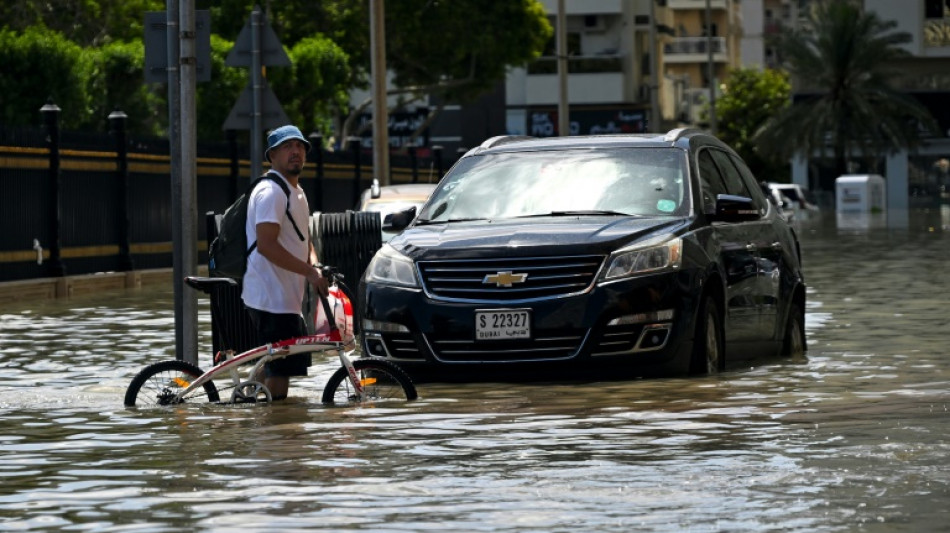

Dubai roads, airport reel from floods after record rains
Dubai's giant highways were clogged by flooding and its major airport was in chaos as the Middle East financial centre remained gridlocked on Wednesday, a day after the heaviest rains on record.
Tailbacks snaked along waterlogged, six-lane expressways after up to 259.5 millimetres (10.2 inches) of rain, the most since records began 75 years ago, fell on the desert United Arab Emirates on Tuesday.
At least one person was killed after a 70-year-old man was swept away in his car in Ras Al-Khaimah, one of the oil-rich country's seven emirates, police said.
Power outages were reported around Dubai, which was dotted with flooded areas and submerged and abandoned cars. One road tunnel near the airport was completely flooded to a depth of several metres (yards).
As sunny skies returned on Wednesday, a day after torrential downpours and rolling black clouds, stories emerged of residents stuck in cars and offices overnight.
"It was one of the most horrific situations I had ever experienced, because I knew that if my car broke down, it would sink and I would drown with it," said one worker in his 30s, who did not want to give his name, after his 15-minute commute had turned into a 12-hour saga on flooded roads.
"I was very afraid," he added.
Schools will remain closed in Dubai until next week, authorities said, underscoring the difficulty of the clean-up.
One householder, also requesting anonymity, said he made a small detour on his way home on Tuesday to buy McDonald's for his children, only to get stuck in traffic and finally arrive -- empty-handed -- six hours later.
"I can understand that the country can't deal with rain on this scale, but the lack of transparency and real-time information is disappointing," he said.
- 'Chaos' -
Passengers were warned not to come to Dubai airport, the world's busiest by international traffic, "unless absolutely necessary", an official said.
"Flights continue to be delayed and diverted," a Dubai Airports spokesperson said, calling working conditions "very challenging".
Dubai's flagship Emirates airline cancelled all check-ins as staff and passengers struggled to arrive and leave, with access roads flooded and some metro services suspended.
At the airport, long taxi queues formed and passengers milled around, many growing increasingly frustrated as nearly every departure was repeatedly delayed.
"They are completely lost, its complete chaos -- no information, nothing," fumed one passenger, who did not want to be named, after a 12-hour wait.
Meanwhile, a large crowd gathered at a connections desk, clapping and whistling in protest at the lack of information. Scores of flights were also delayed, cancelled and diverted during Tuesday's torrential rain.
The storms hit the UAE and Bahrain overnight Monday and on Tuesday, after lashing Oman, where 18 people were killed including children.
Climatologist Friederike Otto, a specialist in assessing the role of climate change on extreme weather events, told AFP it was "highly likely" that global warming had worsened the storms.
Maryam Al Shehhi, senior weather forecaster at the Gulf state's National Center of Meteorology, denied a report that the UAE had carried out cloud seeding -- spraying chemicals to increase rainfall.
"We did not use cloud seeding because (the storm) was already strong," Shehhi told AFP.
Official media said it was the highest rainfall since records began in 1949, before the formation of the UAE in 1971.
Schools will also remain closed until next week in Bahrain, which saw record one-day rainfall of 96.88mm on Tuesday, beating the 67.9mm witnessed in 1995.
(R.Dupont--LPdF)




